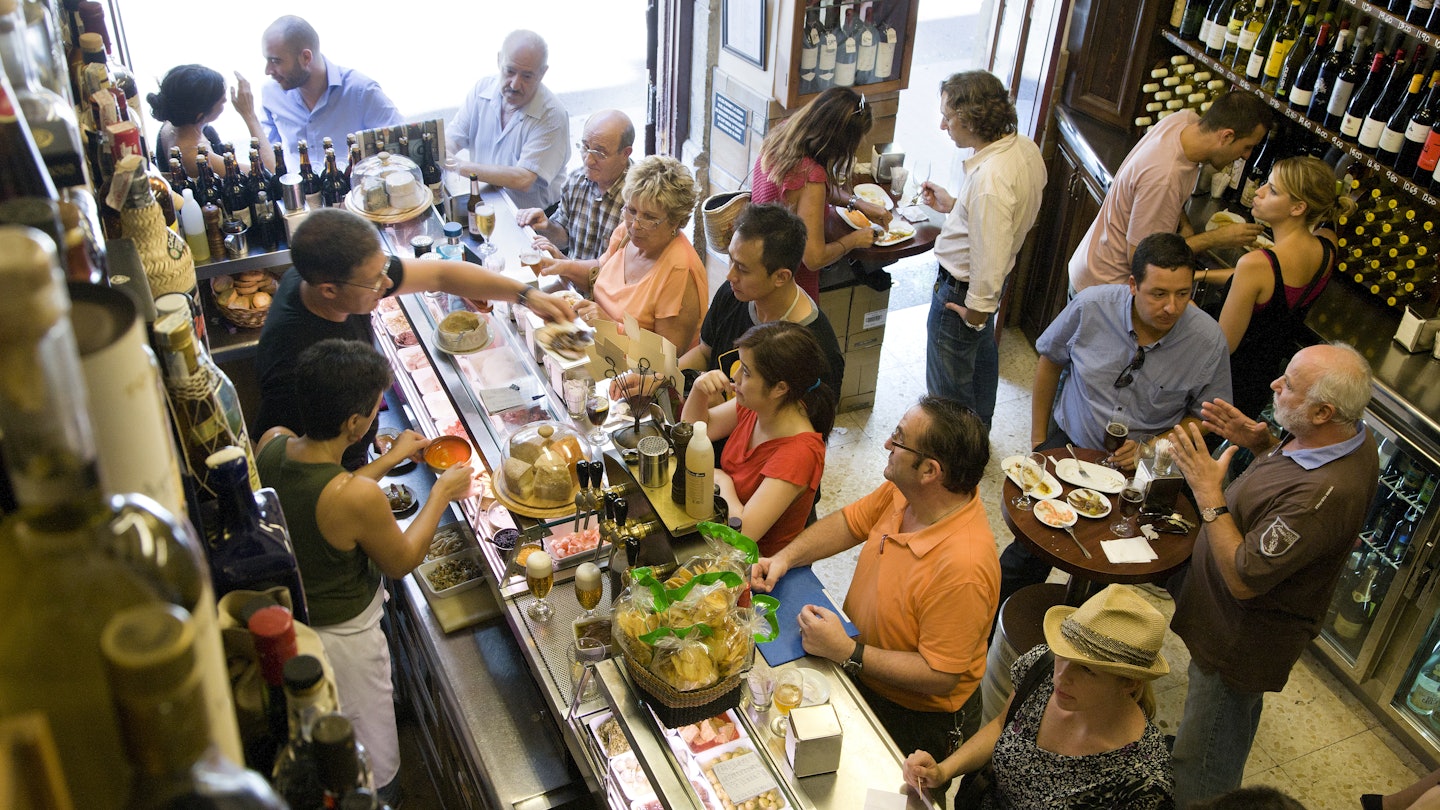

Tapas has a long history in Spain and around the globe, but can it survive the COVID-19 pandemic? ©Michael Heffernan/Lonely Planet
Few culinary imports are as recognizable around the world as tapas. Spain's near universally beloved tradition of small share plates of bite-sized goodness, often chased with your tipple of choice at a local watering hole. Similar (Portuguese petiscos) and related (Italian aperitivo and cicchetti) traditions exist in neighboring countries, but you can round up a group of friends and share tapas pretty much anywhere – from Jacksonville to Johannesburg.
Or you could, anyway. By now, we've all wondered what a post-pandemic world will look like and which of our beloved habits and traditions are at risk of being lost altogether. The jury is still out on Western greeting norms like handshakes and cheek kisses; masks may simply become a permanent wardrobe accessory; and chowing down at a self-service buffet is on life support, but what about tapas? Should we be worried?
"The culture of tapas won't be affected," says chef Iván Morales of Madrid's Arzábal restaurant, who is currently co-authoring a forthcoming book on tapas. "If we take care with the cooking and handling, it won’t generate suspicion. We don’t yet know how the customer will be affected but tapas to be shared in small portions will be prepared individually to lavish the customers who ask for a drink."
Next door in Portugal, chef Henrique Sá Pessoa agrees with Morales. Sá Pessoa's Lisbon eateries include the Michelin-starred Alma as well as the more casual Tapisco, the latter marrying Spanish tapas with Portuguese petiscos in an Iberian small-plate dream eatery.
"Maybe some concepts will adjust during this period but eventually those traditions will come back – they have been around for centuries!" says Sá Pessoa. "Masks, antibacterial gel, individually wrapped cutlery, distance between tables – we will need to adjust to the virus, [but] we will cook with the same passion and focus on the robust flavors that defines our cooking."
Traditionally speaking, tapas (also known as pinchos in northern regions of Spain) were free and often shared from a tray at the bar, a tradition that is mostly extinct in many regions of Spain (you can still fill your belly for free in some parts of Andalucía) – a change that might be its saving grace during the COVID-19 pandemic. While the science remains a work in progress, self-service style food sharing between strangers is likely a thing of the past for now, but there is no reason why small plates of beautiful things cannot be served individually and shared among guests dining together.

"The US Food & Drug Administration notes that while some gastrointestinal viruses like Norovirus and Hepatitis A can be transmitted by food, SARS-CoV-2 is a respiratory virus and there's no evidence of food being associated with the transmission of the virus," says Andrew Hessel, a microbiologist and geneticist by training and Chairman of the Genome Project-Write (Hessel stresses his views are personal, not a reflection of public health policy nor the organizations for which he works.). "The risk comes from sharing the air we breathe with other people that may be in the restaurant, both staff and patrons, particularly in closed or poorly ventilated spaces. But fresh air, social distancing, masks, good food handling, and quick consumption of any tapas plates should all help to minimize the risk of any contamination or transmission of any virus or bacteria."
With Spain in the planning stages of reopening its borders to tourists in July, rest assured that tasty tapas await. Dining out in Spain will surely take on some minor inconveniences until COVID-19 is a distant memory, but it takes more than a global pandemic to knock centuries of Spanish culinary tradition off its bar stool.
"We don't think sharing is a thing of the past," says Morales. "Sharing is living and we don’t understand life without sharing, either with food and a bottle of wine, or things that allow you to be with your people, this is impossible to eliminate. Tapas will always be here."
You might also like:
Could a 20-minute coronavirus test replace 14-day quarantines for travellers?
Street life returns to Paris as cafés and bistros take over the pavements
9 ways tours and adventures will be different after COVID-19
















